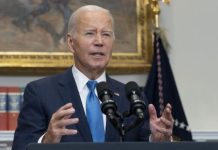
Feb. 2 (UPI) — The United States has declared a public health emergency in response to the ongoing 2019 novel coronavirus outbreak, making all U.S. citizens who have returned from Hubei province, China, over the past 14 days subject to up to a 14-day quarantine.
In addition, all foreign nationals, other than immediate family members of U.S. citizens, who have traveled to China in the past 14 days will be denied entry into the country, Secretary of Health and Human Services Alex Azar said Friday.
The temporary ban takes effect at 5 pm EST on Sunday.
“The risk of infection for Americans remains low. With these and previous actions, we are working to keep the risk low,” Azar said.
According to Azar, American citizens can still enter the United States from Hubei province but may be quarantined for up to 14 days in a facility. Other American citizens who have traveled in mainland China, but not to or from Hubei, may be “self-quarantined” in their homes.
These measures will “increase our abilities to detect and contain the coronavirus,” Azar said.
Officials at the U.S. Centers for Disease Control and Prevention also announced Friday that they have formally placed 195 Americans evacuated from Wuhan, China, on quarantine, the first time the drastic step has been taken in more than 50 years.
The 195, who returned to the United States on a State Department-chartered plane on Wednesday, will remain housed at March Air Reserve Base in California for a minimum of 14 days.
Officials said the action was necessary to contain the virus and prevent community spread “as much as possible.”
The announcement follows reports that officials in Riverside County, where the base is located, had implemented their own quarantine Thursday night after one of the evacuees attempted to leave the base.
A study published this week in the New England Journal of Medicine suggests that people may be able to pass the virus to others before they show signs and symptoms of it themselves. This so-called asymptomatic transmission of 2019 n-CoV is a relatively new finding.
The CDC has repeatedly emphasized that understanding of the virus and how it’s transmitted continues to evolve as new information comes in.
The last time the CDC issued a mandatory quarantine was in the 1960s, for smallpox.
“This legal order will protect the health of the repatriated citizens, their families, and their communities,” the agency said in a statement. “Medical staff will continue to monitor the health of each traveler, including temperature checks and observation for respiratory symptoms.”
“If an individual presents symptoms, medical care will be readily available. Even if a screening test comes back negative from CDC’s laboratory results, it does not conclusively mean an individual is at no risk of developing the disease over the likely 14-day incubation period,” the agency said.





